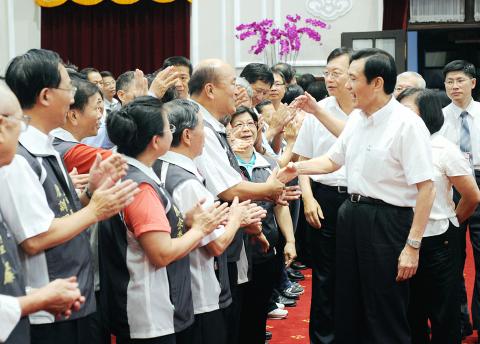President Ma Ying-jeou’s (馬英九) popularity has plunged to its lowest level yet, a poll showed yesterday, amid a bribery scandal involving a top official who had been a key confidant.
Ma’s approval rating fell to 15 percent, according to the survey of 1,303 people conducted by the cable news channel TVBS this week, after former Executive Yuan secretary-general Lin Yi-shih (林益世) admitted taking bribes from a businessman.
Ma’s previous lowest approval rating was 16 percent in August 2009 in another TVBS poll, following Typhoon Morakot, which killed more than 600 people and triggered widespread criticism that his government reacted too slowly.

Photo: CNA
A record high of 64 percent said this week they have no faith in Ma’s future performance, while 78 percent said his administration has poor crisis-management skills, according to the latest poll.
Ma also saw his popularity dive 25 percentage points from a January poll conducted by the channel less than two weeks before he was re-elected for a second term.
Observers said Lin’s bribery case dealt a heavy blow to Ma, who won his second term pledging to fight corruption after former president Chen Shui-bian (陳水扁) was implicated in several graft cases.
Lin, a former vice chairman of the Chinese Nationalist Party (KMT), was taken into custody on Tuesday after he admitted wrongdoing in a case that also implicated his mother and his wife.
Prosecutors did not specify how much money was involved, but a businessman alleged that Lin was paid NT$63 million (US$2.15 million) to help him gain a contract with a state firm two years ago.
Lin was also accused of soliciting another bribe of NT$83 million this year from the same businessman, who took the story to the media.

A Ministry of Foreign Affairs official yesterday said that a delegation that visited China for an APEC meeting did not receive any kind of treatment that downgraded Taiwan’s sovereignty. Department of International Organizations Director-General Jonathan Sun (孫儉元) said that he and a group of ministry officials visited Shenzhen, China, to attend the APEC Informal Senior Officials’ Meeting last month. The trip went “smoothly and safely” for all Taiwanese delegates, as the Chinese side arranged the trip in accordance with long-standing practices, Sun said at the ministry’s weekly briefing. The Taiwanese group did not encounter any political suppression, he said. Sun made the remarks when

The Taiwanese passport ranked 33rd in a global listing of passports by convenience this month, rising three places from last month’s ranking, but matching its position in January last year. The Henley Passport Index, an international ranking of passports by the number of designations its holder can travel to without a visa, showed that the Taiwan passport enables holders to travel to 139 countries and territories without a visa. Singapore’s passport was ranked the most powerful with visa-free access to 192 destinations out of 227, according to the index published on Tuesday by UK-based migration investment consultancy firm Henley and Partners. Japan’s and

BROAD AGREEMENT: The two are nearing a trade deal to reduce Taiwan’s tariff to 15% and a commitment for TSMC to build five more fabs, a ‘New York Times’ report said Taiwan and the US have reached a broad consensus on a trade deal, the Executive Yuan’s Office of Trade Negotiations said yesterday, after a report said that Washington is set to reduce Taiwan’s tariff rate to 15 percent. The New York Times on Monday reported that the two nations are nearing a trade deal to reduce Taiwan’s tariff rate to 15 percent and commit Taiwan Semiconductor Manufacturing Co (TSMC, 台積電) to building at least five more facilities in the US. “The agreement, which has been under negotiation for months, is being legally scrubbed and could be announced this month,” the paper said,

Japan and the Philippines yesterday signed a defense pact that would allow the tax-free provision of ammunition, fuel, food and other necessities when their forces stage joint training to boost deterrence against China’s growing aggression in the region and to bolster their preparation for natural disasters. Japan has faced increasing political, trade and security tensions with China, which was angered by Japanese Prime Minister Sanae Takaichi’s remark that a Chinese attack on Taiwan would be a survival-threatening situation for Japan, triggering a military response. Japan and the Philippines have also had separate territorial conflicts with Beijing in the East and South China